Tyranny review
Grist to the mill.
Tyranny is a Dungeons and Dragons game where the top half of the alignment page has been ripped out and burned. It's a fantasy world where being nice to someone will result in bewilderment from the affected party and scorn from your own. It's an RPG where, rather than choosing between giving someone flowers or stabbing them in the face, you choose between stabbing them in the face or giving them some warning before stabbing them in the face.
The premise has been pitched by games from Dungeon Keeper to Overlord "What if you were the bad guy?" It's an idea that presents itself as original when, in truth, it's almost as clichéd as the hero's quest itself. But Tyranny truly is different. Whereas most games of this ilk revel in villainy, gleefully embracing its chaos and depravity, Tyranny presents to us an evil that is ordinary. It's powered by a giant machine of administration and bureaucracy, the kind that says "I'm just doing my job" as it cranks the wheel of the rack.
What results is an adventure that is terrifying, captivating, and desperately sad, where you wade through a sea of death and torment clinging onto whatever scrap of humanity you can. It's also, at times, an exhausting one, thanks to quests that seem interminably long and a misguided focus on combat.
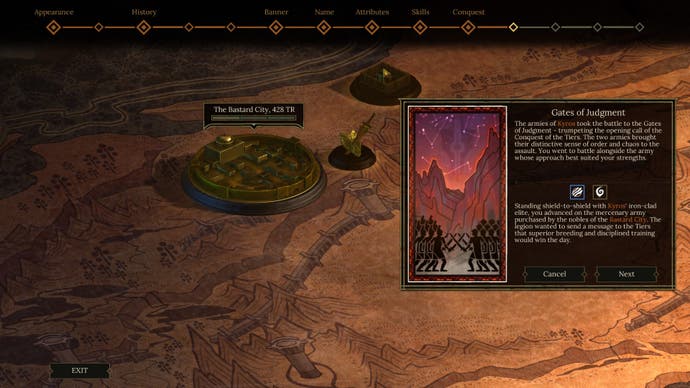
Tyranny begins at the end. The armies of Kyros the Overlord have marched across all the known world, and only one small corner of it, known as the Tiers, still resists his iron grasp. Kyros' twin armies, the orderly Disfavored and the screaming horde of the Scarlet Chorus, bicker at an impasse known as Vendrien's Well about how to crush this last band of rebels. That's where you step in. As one of Kyros' most trusted representatives, you issue a magical Edict that will kill everyone in the valley unless the battle is won within eight days.
While this is where the game starts in earnest, the story begins a little before this in the 'Conquest' prologue, with a choose-your-own-adventure introduction that serves two purposes. First off, it helps grease the choking bolus of lore which Tyranny requires you to swallow, and second, it sets up your relationships with the various factions who squabble over the ashes of the world.
With virtually all the good snuffed out of the realm, much of Tyranny is about figuring out what kind of monster you want to be. To help you decide, it offers two stark choices through the armies that bring the hammer to fall on Kyros' enemies. The Disfavored are essentially the Romans and the Third Reich combined, espousing military order and their own racial superiority, led by the honourable yet fiercely uncompromising Graven Ashe. The Scarlet Chorus, meanwhile, are the Mongol Horde, where a person can find a twisted form of freedom, provided they're willing to do an awful lot of killing in the process. Their leader is the Voices of Nerat, a strange composite of personalities that oozes wit and charm, while being about as reliable as this year's political polls.
It's possible to side with either of the two main factions, or forsake any alliances and forge your own path to glory. Either way, your relationship with these and a half-dozen other factions throughout the world are influenced by the decisions you make on your journey, affecting how individuals respond to you further down the line. In fact, sometimes a little too far down the line. Several times I had characters either betray me or refuse to deal with me due to decisions I made in the prologue, the significance of which evaded me at the time because the game hadn't truly started. There were also times when Tyranny seemed to ignore the system completely. Early on I tried to cross a bridge guarded by mercenaries running a toll, and while the scenario hinted at multiple ways of dealing with this, including a leadership dispute that seemed ripe for exploitation, I exhausted all the dialogue choices and was left with no alternative but to fight my way through.
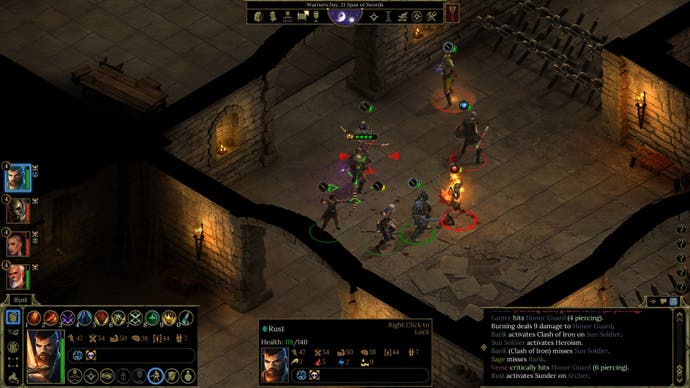
Given how complex the reputation system is, some inconsistences are perhaps to be expected. It even extends to your party, who in typical Obsidian fashion are a brilliant bunch of misfits and miscreants. Take Barik, for example, a Disfavored soldier whose armour became fused to his body during another Edict you enact in the prologue. Barik is fully committed to the Disfavored's code of honour, which makes him loyal and dependable, but also utterly merciless toward anyone who shows defiance to Kyros, and contemptible of the Scarlet Chorus' anarchic ways.
Nevertheless, it's hard not to feel sorry for him, as the armour that protects him is also a massive burden, preventing him from washing and forcing him to fight while smeared in his own excrement. An equally interesting character is Eb, who starts the game fighting against Kyros, and joins your party out of a mixture of respect for you and resignation to the inevitable. Watching her be gradually corrupted by the unfolding events is simultaneously fascinating and disturbing.
Tyranny's approach to party interaction is a contradictory one. The reputation system means their attitudes toward you shift as the story progresses, viewing you with respect, anger or fear depending on how they judge your leadership. But they don't have stories of their own. Each has a background, sure, but you never get to explore it much further than the odd conversation, which makes the game feel less rounded than Obsidian's other recent RPG, Pillars of Eternity.
In combat, however, your relationship with your party becomes incredibly important. Each member has a range of powerful abilities that are performed with your central character. Eb's combined power is a powerful spell that lifts your party off the ground, healing them while simultaneously damaging enemies. Barik, meanwhile, pulls rusted blades out of his twisted armour before firing them at your opponents. As your relationship with each character improves, more powers are unlocked, while further abilities become available to your own character as their renown spreads through the world.

Coupled with the fact that each character has multiple ability trees to choose from, and a nifty spell creation system where various runes can be combined for dozens of effects, Tyranny's combat system is both more flexible and creative than that seen in Pillars. That said, it remains staunchly traditional. Sticking to RPG archetypes (tank, damage dealer, healer etc) is the surest path to victory, while using formations and the surrounding terrain to your advantage is key to preventing your party from being overwhelmed.
Despite the quality of the underlying systems, I eventually grew tired of the combat simply because there is so much of it. You can barely go five paces in the world without someone pulling their blade on you. Obviously, you're in the middle of a war, but the act of combat simply isn't as interesting as the story that Tyranny tells. After a while, it begins to feel like the endless skirmishes are padding the game out.
This issue compounded by the fact that some quests seem to go on for forever. One mission that involves finding a way through a magical barrier took at least five hours to complete, requiring me to traipse around an entire province just to track down a magic lapel, which isn't exactly the experience I want from a scoundrel simulator. Tyranny is supposed to be a slighter, more directed experience than Pillars, and although there are certainly fewer side-quests (because nobody is going to ask a weapons-grade bastard to help find their lost sheep) the convoluted nature of some of the main quests result in it being a similar length without the same level of variety.
Nevertheless, I continued to be gripped by Obsidian's anatomy of evil, not simply in the depths of depravity the game lets you reach, but how it leads you down those roads without you even realising. With a legion of proud and noble Disfavored soldiers saluting you as a hero, it's possible to forget who exactly you're fighting for, until your duty compels to you commit one of the worst crimes of all. When you offer mercy to your enemies in exchange for their total surrender, and they respond by spitting in your face, it's so easy to shrug your shoulders and say "Well then, you brought this on yourself." When you travel through the picturesque fields around Vendrien's Well, or to the pristine grandeur of Tunon's Court, it's possible to believe the world ticks on as normal under Kyros' rule. Then you arrive at a place like the Blade Grave, where the very earth arose and ripped through entire armies during the Edict of Storms, and the full scale of the atrocity is plain to see in the thousands of armoured shells that litter the scenery.
In moments like these, the grim brilliance of Tyranny is revealed, and it's undoubtedly worth persisting through the game's weaker stages to experience them. The dark cousin of Pillars of Eternity may not be as polished or comprehensive as Obsidian's standout RPG. But I think, in the end, Tyranny has far more of import to say, and it'll make you listen whether you like it or not.
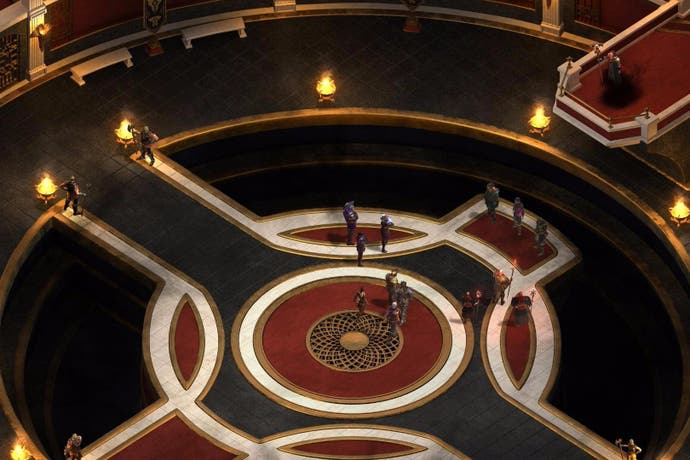



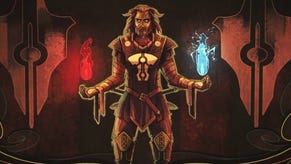


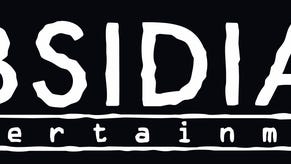
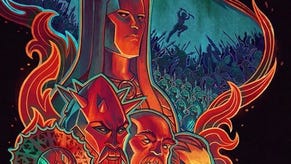


.jpg?width=291&height=164&fit=crop&quality=80&format=jpg&auto=webp)






